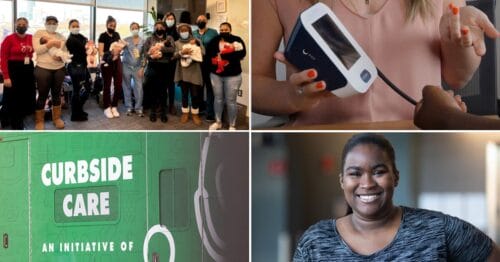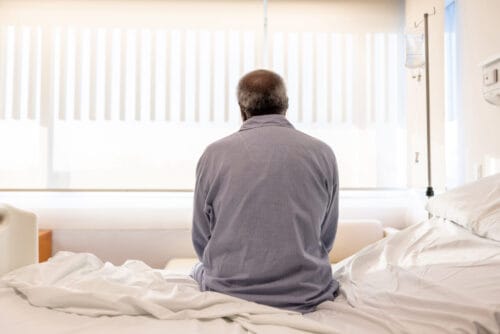Insufficient Mental Health Care for Black Americans Will Extend COVID-19 Inequities
July 19, 2021

Getty Images
Psychiatrist David Henderson warns of the serious consequences that could result from the lasting mental health repercussions of the pandemic on people of color.
The demand for mental health services has soared to new heights in the United States. Not surprisingly, a main driver has been—and will continue to be—the COVID-19 pandemic.
A Kaiser Family Foundation poll found that 4 in 10 adults reported some form of anxiety or depression during the pandemic, up from 1 in 10 adults during the first six months of 2019. At the same time, there are not enough mental health providers available to meet this demand, creating crushing wait times for patients and families. This delay in access to behavioral healthcare can cause a mild or moderate mental health issue to become severe, resulting in the need for emergent care in already packed hospitals with limited psychiatric beds.
These statistics are far worse for people of color, for whom access to mental health services has historically been hindered by structural racism within the healthcare system. Data released from the American Psychiatric Association in 2017 showed that while African Americans are just as likely as the general population to have a mental illness, only 1 in 3 will receive mental health care, including medication or outpatient services. There is not enough access to culturally competent care, and insurance coverage, or lack thereof, can determine whether they can see a mental health clinician.
Recent studies have demonstrated the disproportionate impact that COVID-19 has had on people of color. A report by the Centers for Disease Control and Prevention from April 2020 showed that while Black Americans comprise 13% of the country’s population, they made up 30% of COVID-19 cases. Another CDC study out of Atlanta also showed that Black individuals who got COVID-19 were more likely to be hospitalized compared to white individuals.
With all of the loss that was experienced during COVID-19—particularly by people of color—it is not surprising that there are burgeoning mental health needs among this population. David Henderson, MD, chief of psychiatry at Boston Medical Center, answers some of HealthCity’s questions below to give context to some of the current disparities and provides insight on ways to move forward.
HealthCity: What have you been seeing in terms of the need for mental health care at BMC, and in Boston, as a result of COVID-19?
David Henderson, MD: We’ve seen a dramatic increase of individuals reaching out for mental health support throughout the pandemic, particularly in people of color. While this increase is expected during a pandemic, there are many deep-rooted racial and social justice issues that are simultaneously coming to the surface, which has created an inordinate amount of stress.
The pandemic has also resulted in a tremendous amount of loss for communities of color—loss of lives, loss of jobs, loss of income—which leads to stress. Many psychiatric disorders are stress-related, and people of color have higher rates of stress due not only to COVID, but because of the inequities that continue to exist across the healthcare system.
I anticipate that the biggest long-term impact from COVID-19 will be the lasting mental health issues, which if not addressed could lead to some very serious consequences.
HC: What particular factors make access to mental health care difficult for people of color?
DH: Race and racism play out in mental health access and outcomes in a big way. First, when people of color are in need of mental health care, many are not willing to seek out treatment because of previous bad experiences within the healthcare system. This delay can result in inaccurate diagnoses or treatment.
While anxiety and depression are stress-related disorders, these cases can be missed if a person is in the emergency room because they have delayed their care to the point of an emergency. For example, a 2019 study showed that Black individuals are more likely to be misdiagnosed with schizophrenia instead of severe depression, indicating that the focus on psychotic symptoms is emphasized over major depression symptoms in people of color. These are issues that need to be addressed at all levels of medical education in order to better equip mental health providers with the skills and knowledge to treat patients of color more appropriately.
Another factor that affects access to culturally competent care for people of color is the lack of providers of color within the mental health care field. I urge people of color who prefer to have a provider of color to ask when reaching out for mental health care; however, I also caution that there may not be one available. Additionally, there is the stigma related to having a mental health issue in the Black community. According to the National Alliance on Mental Illness, 63% of Black Americans consider a mental health illness as a sign of weakness, which contributes to delayed treatment.
HC: How does insurance play a role in accessing mental health care?
DH: This is an extremely important factor as there are currently two insurance systems at play. Publicly funded insurance, such as Medicaid and Medicare, have limited providers available for mental health services, as we know. Additionally, there are many psychiatrists, counselors, and psychologists who are in private practice, many of which do not take insurance. So, if a patient can’t afford to see someone without insurance, their options are even more limited.
We have much work to do in order to increase access to mental health services across the board, but particularly for patients of color. This requires a multi-faceted approach, including reducing the stigma associated with mental health conditions, increasing the diversity of the workforce, and better engaging with people of color wherever they access the healthcare system to assess and address their mental health needs.
This interview has been edited and condensed.


